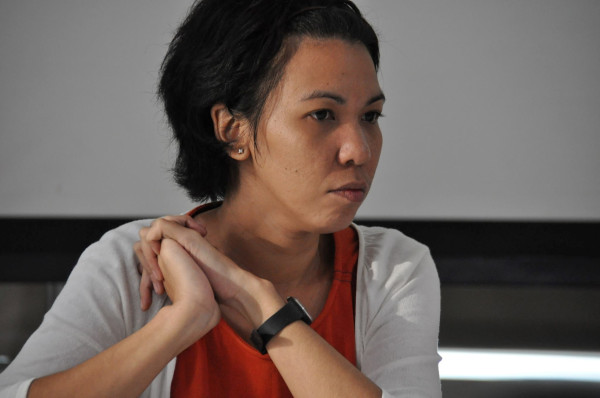Like-minded 志同道合
-
The Library: How do you see the importance of the collection?
Dayang Yraola: We care for about 2700 hours of audio recording on open-reel and 750000 pages of field notes, and these are the notes that anthropologists and ethnomusicologists used when they went to the field to record ethnic music.
And then we have 25 titles of composition, 10000 photographs. Now our center has been inscribed, it’s an office under the University of the Philippines where I came from. It was inscribed in the UNESCO Memory of the World Register in 2006 because of the importance of the collection, not just in the Philippines, but the rest of Asia. So, other anthropologists, ethnomusicologists and musicologists have been donating their collection since then.
Now I think we have 5 other ethnomusicologists who have deposited their recordings. F. Landa Jocano who has a very thorough research in Central Philippines – if you heard about the typhoon Haiyan, it is that area that was most devastated. There is a long epic tradition in that area. The recording of those two weeks before the typhoon happened, has been fully digitized in my center, so it’s a matter of chance, and also some from the north, they have already donated to the collection in my center.
-
The Library: With all these collections, how do you think people can relate to them?
Dayang Yraola: For the first few years when I was there, I thought that my ultimate task is to keep it and make it relevant, but as soon as I was able to bring it out, I realize that for it to be relevant, then people have to have a relationship with it.
The first art project I did with the Center is “Listen to my music” (http://www.dayangyraola.com/2014/09/listen-to-my-music.html) . “Listen to my music” is supposed to be a tribute for José Maceda, as a composer, as an ethnomusicologist. We exhibited some of these collections. I invited some artists and engineers to take a look at the center to find out if there is something in there that would interest them.
With “Listen to my music”, the intention is to make other people interested in what we have and for them to find out how else it can be used for their own affairs, not just for traditional musicology. After the exhibition, we got requests for use of the archive – from a neuroscientist; and requests from statisticians, to do something else, and we got so many requests from visual artists, doing installation works as they get incorporated into the art collection.
-
The Library: Is the Center the only ethnomusicology archive in the Philippines?
Dayang Yraola: I don’t know if it is fortunate or unfortunate that we are the only ethnomusicology archive, oh…there are two of us now. Three years ago, there was just us, but now there are two of us, another is also in Manila, they are the ones who’s taking care of all epics.Their collection is exclusively epics, ours is a mixture of ritual music, healing music, harvest, etc.
-
The Library: Is there any challenge that the Center is facing?
Dayang Yraola: The challenge now is, for us, the center, to how to accommodate people, because for the longest time, the center has been there for 17 years, only dealing with the people in College of Music, so the challenge for us now, is how to deal with people who are not from the College. And I will not always be there and accommodate them, so my staff are learning to deal with other people.
-
聲音圖書館:你怎樣看中心館藏的重要性?
Dayang Yraola: 我們保管約二千七百小時的舊式開盤磁帶錄音及七十五萬頁的田野筆記,這些筆記都是人類學家和民族音樂學家到田野收錄民族音樂時使用的。
而且我們有二十五組合集及一萬張照片。現在我們中心已列入我畢業的地方-菲律賓大學名下的辦公室, 因為館藏的重要性,不單對菲律賓而言,而是整個亞洲,故中心於2006年獲聯合國教科文組織列入世界記憶名錄。由那時開始,其他人類學家、民族音樂學家和音樂理論學家相繼捐出他們的收藏。
我想現在我們已有五位民族音樂學家交存他們的錄音。F.蘭達.約克羅(F. Landa Jocano)對菲律賓中部有著非常透徹的研究。如果你聽過颱風海燕,那裡是受災最嚴重的地區。這一帶有悠久的史詩傳統。於颱風前兩星期的錄音,已在我的中心完全數位化,所以它是一次機遇。同時亦有些錄音是來自北方,它們已經在我中心的收藏之中。
-
聲音圖書館:有了這些館藏,你認為人們可以如何與它們產生關係呢?
Dayang Yraola: 當我在中心的頭幾年,我以為自己的責任就是保存它,令它有關聯。但當我能夠把藏品展示出來時,我明白如果想它有關聯,那麼人們必須與它有一段關係。
《來聽我的音樂》(Listen To My Music)是我和中心策劃的第一個藝術項目(http://www.dayangyraola.com/2014/09/listen-to-my-music.html)。《來聽我的音樂》本應是向作曲家、民族音樂學家何塞.馬塞達(José Maceda)致敬。我們展出部分的藏品,邀請了一些藝術家和工程師前來觀看,嘗試找出當中有沒有引起他們興趣的東西。
《聽我的音樂》的目的是讓其他人對我們的藏品感興趣,同時讓他們找出如何把館藏應用在自己的事情上,而不僅是傳統音樂之中。展覽之後,我們收到使用檔案館的申請作其他用途,包括一位神經學家及和統計人員們。而我們也收到很多視覺藝術家的申請,利用館藏創作裝置作品。
-
聲音圖書館:中心是菲律賓唯一的民族音樂學檔案館嗎?
Dayang Yraola: 不知道這是幸運還是不幸,我們是唯一的民族音樂學檔案館。噢……現在有兩所檔案館了。三年前只有我們,但現在有兩所。另一所檔案館都是位於馬尼拉,他們專責保管史詩。他們的收藏全是史詩,而我們的則是關於儀式、治癒、豐收等不同的音樂。
-
聲音圖書館:中心面對著甚麼挑戰嗎?
Dayang Yraola: 對我們來說,中心現在的挑戰是如何適應人們。中心已成立17年,在這段很長的時間我們只接觸音樂學院的人,所以現在我們面對的挑戰是如何適應學院以外的訪者。但我不是經常留在中心歡迎他們,故我的員工正學習如何接待其他到訪者。

Dayang Yraola, former collection manager/ archivist at The University of the Philippines Center for Ethnomusicology
Dayang Yraola,前菲律賓大學民族音樂學研究中心館藏經理 / 檔案保管員